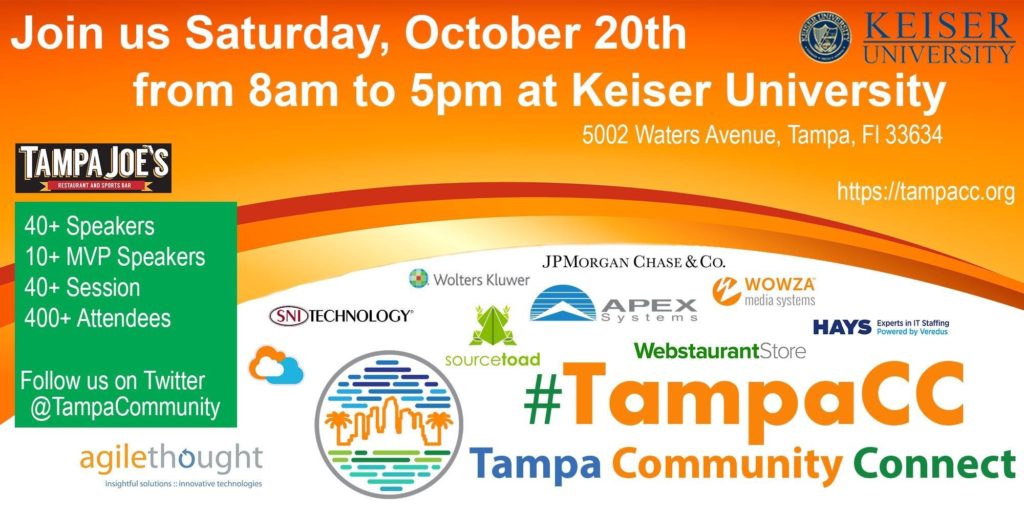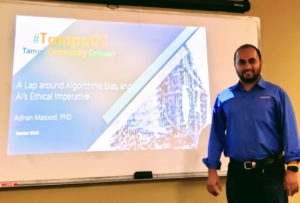TampaBay Community Connect CodeCamp on Sat 10/20 at Keiser University was a success with over 400 attendees and 40+ sessions including 10+ fellow MVPs. I had the privilege to speak on Democratization of AI with Cognitive Services, Bias in Algorithms, and ONNX for model exchange.
Following are the brief abstracts and slides from the talk
Operationalizing AI - Portable ML Model Sharing across Enterprise
Slides: Tampa Bay Codecamp - Operationalizing AI - Portable ML Model Sharing across Enterprise
Advanced Cloud (Room 326) 03:00 PM - 03:50 PM
The tremendous impact of Artificial Intelligence and Machine learning, and the uncanny effectiveness of deep neural networks are hard to escape in both academia and industry. Albeit, the eco-system of deep learning frameworks is complex, making it difficult to choose the 'right one'. But what if you don't have to limit your choice, and if you could use the most developer-friendly framework for designing a neural network, the most efficient framework for training, and the most efficient one for evaluation and inference on the edge devices? Facebook, Microsoft and Amazon jointly created the ONNX (Open Neural Network Exchange) as an open format to represent deep learning models. ONNX enables interoperability between deep learning frameworks such as Apache MXNet, Caffe2, Microsoft Cognitive Toolkit, and PyTorch. ONNX model zoo enables developers to easily and quickly get started with deep learning using any framework supporting ONNX. In this talk, we would review the role of deep learning frameworks in democratization of Artificial intelligence, and how to empower AI developers to choose the right tools as their project evolves. Furthermore we will explore the ONNX ecosystem which includes converters from and to popular deep learning frameworks (currently Caffe2, Microsoft Cognitive Toolkit, MXNet, and PyTorch) as well as bindings to hardware-optimized libraries like NVidia TensorRT. We will discuss the challenges of transferring models from one framework to another and how ONNX solves for this. Also, in this session you can find out how the ONNX framework can help you take AI from research to reality as quickly as possible.
Democratization of AI with Microsoft Cognitive Services
Slides:Tampa Bay Codecamp - Democratization of AI with Microsoft Cognitive Services
Beginner Cloud (Room 326) 10:00 AM - 10:50 AM
Microsoft Cognitive Services let you build apps with powerful algorithms to see, hear, speak, understand and interpret our needs using natural methods of communication, with just a few lines of code. Easily add intelligent features – such as emotion and sentiment detection, vision and speech recognition, language understanding, knowledge and search – into your app, across devices and platforms such as iOS, Android, and Windows, keep improving, and are easy to set up. In this talk we will review the API around Vision, Speech, Language, Knowledge, and write code to implement Microsoft cognitive services APIs. The session covers how to work with unstructured text and turn unstructured text into meaningful insights into mobile, web and line of business applications. We will see how to use a few lines of code to easily analyze sentiment, extract key phrases, detect topics, and detect language for any kind of text. The session is code driven & will provide samples on how to build smart apps with cognitive services from Microsoft.
A Lap around Algorithmic bias, and AI’s Ethical Imperative
Slides:Tampa Bay Codecamp - A Lap around Algorithmic bias, and AI’s Ethical Imperative
Beginner Cloud (Room 326) 01:00 PM - 01:50 PM
Algorithmic bias is shaping up to be a major societal issue as Artificial Intelligence and Machine Learning continue to rapidly transform the industries. Implicit algorithmic bias poses a threat to fairness, diversity, transparency, and neutrality associated with data driven decision making. It is easy to say that the Algorithms Aren’t Biased, we (humans) Are, but is the kind of prejudice and discrimination that already prevails in society inscrutable? GDBR’s right of explanation for all individuals to obtain “meaningful explanations of the logic involved” when automated (algorithmic) individual decision is involved is making leadership across industries think long and hard about upcoming regulations pertaining to black-box automated decision-making systems. In this talk, we will explore the question of why do algorithms discriminate? What is unfair bias, Who is in control of the data, How can outsiders validate algorithms and given these risks, how should we use algorithms? Fairness and Bias in an Algorithmic Age has countless examples from Norman’s Rorschach inkblots to COMPAS (Correctional Offender Management Profiling for Alternative Sanctions), flawed and misrepresentative systems used to rank teachers, gender-biased models for natural language processing, and voice interfaces, chatbots, and other systems are discriminating against certain minority dialects. Algorithms that may conceal hidden biases are already routinely used to make vital financial and legal decisions. Proprietary algorithms are used to decide, for instance, who gets a job interview, who gets granted parole, and who gets a loan. This talk focuses on questions like controlling machine-learning algorithms and their biases, the merit of approximation models as a reasonable way to get insight, right of explanation, and how to apply AI within many domains which requires transparency and responsibility such as health care, finance, surveillance, autonomous vehicles, and government. We will briefly cover concepts around algorithmic discrimination, sources of algorithmic bias, measures of discrimination and finally ACM's guidelines for detecting and preventing algorithmic bias. This is an active area of research and this talk manifests tip of the ice-berg; by exposing spectrum of hard questions around algorithmic bias we need to answer if we expect to benefit from advances in algorithmic technology.
Happy Coding!


